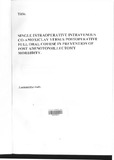| dc.contributor.author | Mutiso,David M | |
| dc.date.accessioned | 2013-04-11T12:13:59Z | |
| dc.date.issued | 2009 | |
| dc.identifier.citation | Master of Medicine in Ear, Nose and Throat-head and Neck Surgery | en |
| dc.identifier.uri | http://erepository.uonbi.ac.ke:8080/xmlui/handle/11295/15831 | |
| dc.description.abstract | Adenotonsillectomy is one of the commonest operations in otolaryngology.
The postoperative morbidity includes pain, infection and reduced food intake that may result in dehydration. The morbidity of adenotonsillectomy has been shown to reduce when antibiotics are used in the postoperative period. Surgical prophylaxis has been shown to prevent postoperative infection and reduces the emergence of virulent microorganisms.
Methodology: A randomized clinical trial was done in Kenyatta National Hospital between 28/5/08 and 17/10/08 in which 126 patients under the age of 12 years undergoing adenotonsillectomy were recruited. 63 were given a single dose of intraoperative Co-Amoxiclav intravenously while the remaining 63 were given postoperative oral Co-Amoxiclav. All were, in addition given oral Paracetamol in the postoperative period. Analysis was done with regards to postoperative pain assessed using the visual analogue scale, fever and the diet tolerated in the postoperative period for seven days.
Results: There was no statistical significance difference between the two groups with regards to postoperative pain, fever and diet tolerated. All had a P-value of> 0.2. Postoperative pain was highest in the first postoperative day and reduced progressively to the lowest level on the 7th postoperative day. As pain reduced, more patients were able to tolerate a more solid diet with all but 6 tolerating a solid diet. 4 patients developed fever in the 1 st postoperative day, which did not progress to require further investigation or change of management. One patient had fever on the 4th and 7th postoperative day and was admitted in the pediatrics ward with a chest infection. All were in the group that was on oral postoperative Co- Amoxic1av.
Conclusion: A single intraoperative dose of Co-Amoxiclav given intravenously at induction is just as effective as a full oral course of the same given postoperatively in prevention of postoperative morbidity after adenotonsillectomy. | en |
| dc.language.iso | en | en |
| dc.publisher | University of Nairobi | en |
| dc.title | Single intraoperative intravenous co-amoxiclav versus postoperative full oral course in preventioyn of post adenotonsillectomy morbidity | en |
| dc.type | Thesis | en |
| dc.description.department | a
Department of Psychiatry, University of Nairobi, ; bDepartment of Mental Health, School of Medicine,
Moi University, Eldoret, Kenya | |
| local.embargo.terms | 6 months | en |
| local.publisher | Department of Surgery | en |

